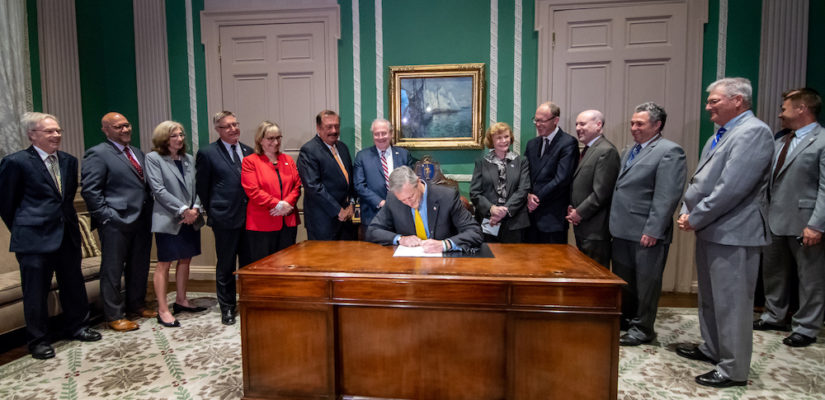Who is a member?
Our members are the local governments of Massachusetts and their elected and appointed leadership.

On June 28, Gov. Charlie Baker signed a law that incrementally raises the state’s minimum wage to $15 an hour by 2023, gradually eliminates time-and-a-half pay on Sundays and holidays, creates a permanent sales tax holiday on Aug. 11-12, and establishes a paid family and medical leave program.
The so-called “grand bargain” law will establish a Department of Family and Medical Leave within the Office of Labor and Workforce Development. Under the law, employees may take up to 12 weeks of paid family leave, up to 26 weeks of paid family leave to care for a covered service member, and up to 20 weeks of paid medical leave, making the law the most progressive family and medical leave program in the country.
The family and medical leave provisions are a local option that may be adopted by a majority vote of the municipal legislative body.
Family leave may be taken to bond with a child during the first 12 months after the child’s birth or for placement of the child for adoption or foster care, to care for a family member in the event that another family member is on active duty, to care for a family member who is a covered servicemember, or to care for a family member with a serious health condition.
Covered employees may take medical leave for any serious health condition.
An employee may take family leave immediately after medical leave during pregnancy or recovery from childbirth, and leave may be taken on an intermittent basis, except for leave to bond with a child, unless the employee and the employer agree otherwise.
Employers may not require employees to use accrued paid leave, including sick, vacation or personal time, and leave under the law runs concurrently with any leave taken under the federal Family and Medical Leave Act and the Massachusetts Parental Leave Act. The law specifically provides that vacation time, sick leave, bonuses, advancement, seniority, length of service credit or other employment benefits, plans or programs shall continue to accrue during an employee’s leave as if the employee had continued to work.
An employee wishing to take leave under the law must give at least 30 days notice to the employer of the anticipated start date, length of leave, and the expected date of return, or as soon as possible if the delay is for reasons beyond the employee’s control.
Upon returning to work, an employee who has taken family or medical leave must be returned to her previous position, or to an equivalent position, with the same status, pay, benefits, length of service credit, and seniority as of the date of the leave.
The family and medical leave program will be funded through a payroll tax that will be taken from both employers and employees and put into a state fund, the Family and Employment Security Trust Fund, beginning on July 1, 2019. The program will begin on July 1, 2021.
Municipal employees are not covered by the minimum wage increase because the state has different wage and hour laws for public employees. Public employers will continue to follow the federal minimum wage law.
The law was passed as a result of negotiations among business groups, advocates and grassroots organizations that were collecting signatures to put the issues on the ballot in November 2018. With the Legislature achieving a “grand bargain,” the issues will not go to voters in November.